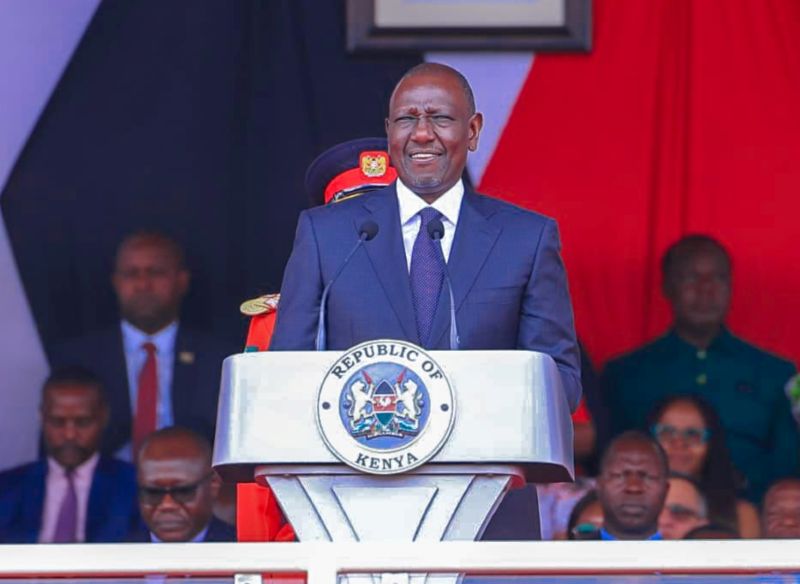Opinion: Negligence by healthcare workers greatly undermines public trust

There needs to be a robust mechanism for monitoring and evaluating healthcare practices to ensure that standards are upheld.
The recent demonstrations across Kenya have brought to focus many unsettling truths, one being about the situation of the public healthcare system.
While the spotlight has primarily been on political and economic grievances, it is the state of our healthcare facilities that has struck a particularly disconcerting chord. From fabricated causes of death to blatant negligence by healthcare workers, the crisis is both alarming and unacceptable.
More To Read
- 107,000 community health promoters to get SHA insurance, prompt stipends under new government plan
- Government cash transfers improve health outcomes for women, children - Lancet
- African countries take lead in push toward universal health coverage for 1.5 billion people by 2030
- KMTC students to start accessing Helb loans after final talks next week
- Kenya’s maternal mortality ‘a crisis that cannot be ignored’, MP Nyikal warns
- How Riruta’s upgrade to Level IV hospital is transforming healthcare across Dagoreti
In times of national turmoil, it is easy to attribute failures in public service delivery to the larger, ongoing crisis. However, the systemic issues plaguing our healthcare system are not new; they have merely been exacerbated and brought to the fore by the current state of unrest.
Fabrication of causes of death is a practice that not only undermines the trust in our healthcare system but also disrespects the dead and their families. Accurate cause-of-death reporting is crucial for public health data and ensuring families get closure. The fabrication of these records for any reason is an unethical and dangerous practice that must be stopped.
Negligence among healthcare workers is another pressing issue.
While it is true that many healthcare workers are overworked, underpaid, and operate in under-resourced environments, this does not excuse the life-threatening lapses in care that have been reported. Instances of patients being left unattended for hours, improper administration of medication, and a general lack of empathy and diligence in patient care have led to unnecessary suffering and, in some cases, death. These actions, or inactions, erode the very foundation of the medical profession, which is built on the principles of care, compassion, and ethical responsibility.
The underlying causes of these issues are many-sided.
At the heart of the problem is a severely underfunded healthcare system. Chronic underinvestment in healthcare infrastructure, inadequate staffing, and insufficient medical supplies are rampant. This has created a high-pressure environment where healthcare workers are stretched thin and resources are scarce. While these conditions are undoubtedly challenging, they do not absolve individuals of their professional and ethical obligations.
Lack of accountability
Moreover, the lack of accountability and oversight has allowed these issues to fester. There needs to be a robust mechanism for monitoring and evaluating healthcare practices to ensure that standards are upheld. This includes regular audits, transparent and working reporting systems and encouraging whistleblowing without fear of reprisal. Only through stringent accountability measures can we begin to address the rot in our healthcare system.
The current demonstrations, while focused on broader socio-political issues, have provided a unique opportunity to address these deep-seated problems. The heightened attention on public services can be leveraged to demand better healthcare policies and practices. It is a call to action for the government, healthcare administrators, and the public to prioritise healthcare reform.
For the government, this means not only increasing the budgetary allocation for healthcare but also reconsidering the current devolution system, which has proven ineffective for the healthcare sector. By bringing healthcare back under national control, the government can ensure hospitals are adequately equipped and staffed, providing a more unified and efficient approach to managing healthcare resources. Centralised management would allow for better coordination, consistent standards, and equitable distribution of resources across the country. This shift would address the systemic issues that have plagued the healthcare system, ensuring all Kenyans have access to quality medical care.
It also means implementing policies that protect the rights and well-being of health workers while holding them accountable for their actions. Healthcare administrators must focus on creating supportive and efficient work environments that minimise burnout and encourage best practices. This includes providing continuous professional development and mental health support for healthcare workers.
The public has a crucial role in advocating for their rights. Community engagement and advocacy can drive the demand for better healthcare services. By holding local leaders and healthcare providers accountable, the public can push for transparency and improvements in the system. One thing the public should know is that they have a right to receive quality health services.
It is time for all stakeholders to come together and address the rot in our healthcare system.
The writer is a health record information officer, social change maker, and programme officer at Northern Frontier Medical Association.
Top Stories Today


















































